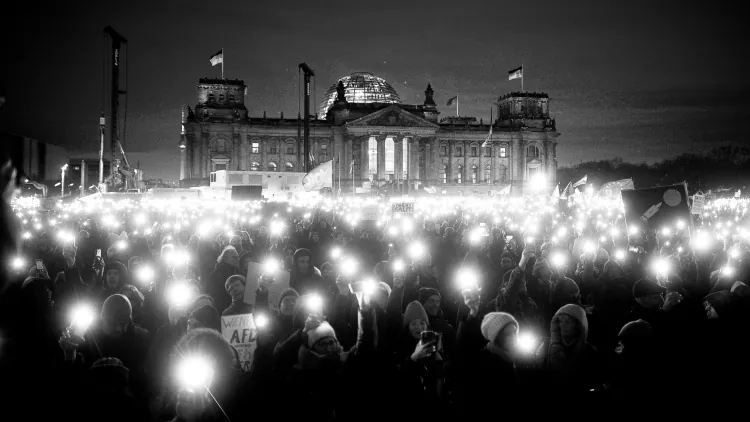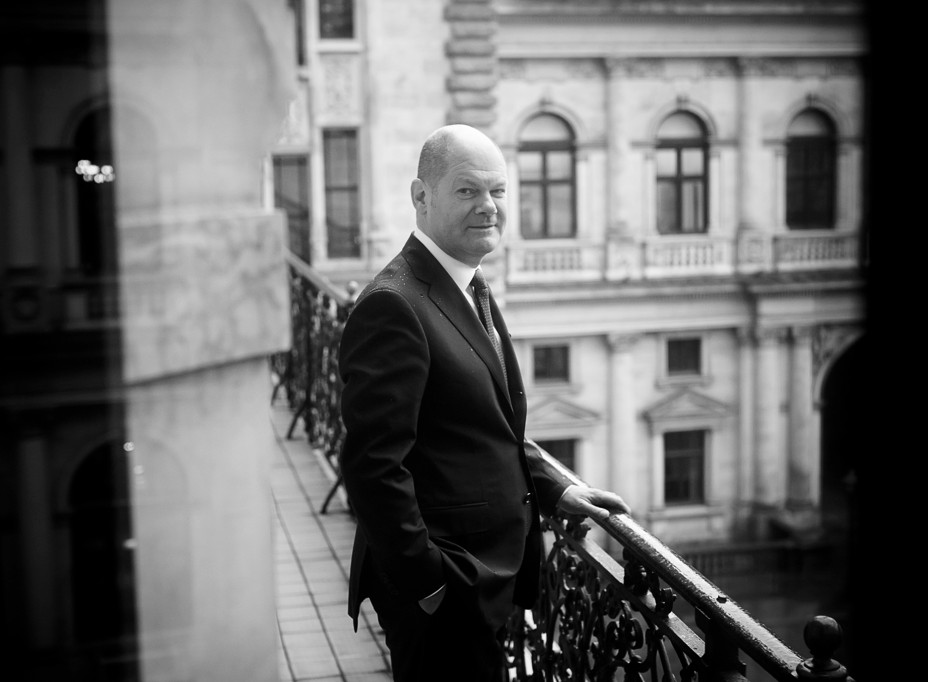Germany’s Zombie Government Is Fueling the Far Right
Extremists are benefiting from the persistence of problems that shouldn’t be so hard to solve.

At a time when far-right movements are surging across Europe, Germany seems to occupy a zone of its own.
On one hand, the country’s far-right Alternative for Germany—the party that wants to make abortion an “absolute exception,” shut down the Ramstein U.S. military base, and turn Europe into a “fortress” against migration—has been gathering strength, its poll numbers rocketing in the past two years from 10 percent to 19 percent.
On the other hand, the country’s civil society and politicians seem to have woken up to the threat: More than 1.4 million citizens have participated in street protests since January against a plan to deport foreigners and naturalized Germans; Bavaria’s populist prime minister, Markus Söder, has proposed cutting all public financing for the AfD; and the government in Berlin is working on a law to protect the constitutional court from a takeover by the nationalist party.
What a contrast with other European countries, such as Finland and Italy, where far-right parties are already part of the government, or France and the Netherlands, whose publics seem to have accepted that nationalist, anti-immigration politicians will soon capture the highest office in their country. Germans are still resisting.
But when it comes to the deeper motivations for the far-right resurgence, Germany appears to be frozen on a destructive course. Europe’s largest economy has stagnated since 2019. With no reprieve in sight, the country’s proud industrial champions have begun to announce large-scale job cuts. And Olaf Scholz’s centrist coalition doggedly insists on balancing the budget, thereby further weakening the economy and producing new social crises—such as when Berlin announced that it would cut agricultural tax breaks to save money, leading to mass protests by German farmers.
[Rogé Karma: What is going on with Europe’s economy? ]
All of this economic trouble is a boon to the AfD, which accuses Scholz of spending money on Kyiv and refugees rather than on German citizens. And recurring strikes—by train operators, health-care workers, and kindergarten staff, among others—are paralyzing public life.
German citizens had grown accustomed to calm and order; now their society is agitated and their government unpredictable. In a January poll, 83 percent of Germans said they were worried about their country—the highest reading since the early 2000s, when unemployment was in the double digits. Federal elections are only 18 months away, and behind closed doors, even Scholz’s supporters concede: The 65-year-old is on course to become the first one-term chancellor since the 1960s.
That would be a major change even from 2020, when German media praised John Kampfner’s cheekily titled book Why Germans Do It Better. The British journalist argued that the Federal Republic’s powerful economy and stable political system were models to the world. Now the German commentariat worries about the country’s economic déclassement. The government is paralyzed, as Scholz’s center-left SPD, the Greens, and the pro-business FDP can’t agree on anything. Literary buffs jokingly speculate on who could become Germany’s equivalent of Michel Houellebecq—the chronicler of his country’s descent.
The AfD poses a threat that many see as singular, both because of Germany’s history and because of the party’s unabashed extremism. Whereas other far-right parties in Europe have come to power by moderating their positions—ditching plans to leave the European Union, for example, or dialing back support for Russian President Vladimir Putin—the AfD has risen despite, or perhaps because of, its radicality. The AfD still flirts with a Dexit from the EU and wants to immediately halt weapons deliveries to Ukraine. Its figurehead, Alexander Gauland, has said that “Hitler and the Nazis are just a speck of bird poop in more than 1,000 years of successful German history.”
In early January, investigative journalists revealed that an AfD member of Parliament and the personal adviser to the party’s leader, Alice Weidel, attended a meeting in a hotel near Potsdam where Martin Sellner, an Austrian neo-Nazi activist, was invited to speak. Sellner, who plastered swastika stickers on a synagogue at age 17, is the author of the extremist bible Regime Change From the Right and calls for the “remigration”—in other words, forced removal—of millions of foreigners and naturalized Germans in order “to preserve the ethno-cultural identity” of Europe. Even the meeting’s location had a sinister resonance: Potsdam is not far from Wannsee, where the Nazis drew up plans for the logistics of the Holocaust in January 1942.
But on the new twilight planet of German politics, despair is only a heartbeat away from hope. Reports of the Potsdam meeting prompted the biggest demonstrations against the far-right in Germany since the early 1990s, bringing together citizens from across generations and social classes. Many protesters expressed the conviction that the moment has come for Germany to make good on its postwar promise of “never again.” The people have a duty, some told interviewers, to fight the far-right resurgence before it is too late. Even Helene Fischer, Germany’s biggest schlager-music star, who has broad appeal among conservative voters, is calling for Germans to turn out for the European elections in June and pick one of the traditional parties. Opinion polls last month and this month have reflected the new energy: Support for the AfD has been dropping, if modestly—from a high of 21 percent in 2023 to 19 percent now.
The AfD certainly has Germany’s political elite worried, however—enough that serious discussions are afoot as to how the country’s institutional order can be made Nazi-proof. Participants on television talk shows debate whether the government should ban the AfD or whether doing so would just allow the party to gain favor by portraying itself as a victim of the political elite.
[Anne Applebaum: Why is Trump trying to make Ukraine lose?]
The constitutional court at Karlsruhe in any case rejected a similar proposal, in 2016, to ban an earlier neo-Nazi party, the NPD. Söder, the Bavarian prime minister, has proposed instead to cut off the AfD from the state’s generous party financing. This move is more likely to pass muster with the constitutional court, which in January banned Die Heimat (the NPD’s successor) from receiving state funding and tax breaks. Scholz is weighing the chances of making a similar move against the AfD. His coalition is also looking to fortify the courts against the AfD’s rising power by making changes to the law governing the constitutional court subject to a two-thirds majority in Parliament rather than the simple majority they require now.
What’s puzzling, however, is that if Scholz really wants to stop the AfD, the most urgent and constructive measures lie well within his grasp: He could take on the economic problems that have been fueling the extremists’ rise. These are not even terribly difficult problems to address. But the permanently squabbling coalition in power seems unwilling or unable to make a plan.
Germans’ principal worries are about inflation and poverty. And they’re right to be concerned: They’re getting poorer. Real wages have been falling every year since 2020. Industrial production is a whopping 9 percent below pre-pandemic levels. As Volkswagen and others realize that the good times won’t come back soon, they’ve been announcing job cuts. The auto supplier ZF reportedly wants to axe 12,000 jobs across Germany within the next six years. And as Germans fret about the future, they save more. Public infrastructure, such as trains and schools, is showing the strains of chronic underinvestment. Scholz, who boasted in 2023 that Germany was about to experience another “Wirtschaftswunder” (economic miracle), has the worst economic track record since Gerhard Schröder. No wonder his popularity has dropped to 20 percent—the lowest rating of any chancellor since the survey began, in 1997.
You might imagine that an unpopular government facing a flagging economy and a rapidly rising far right would try to go big on fiscal policy to limit the damage. But Scholz’s coalition is doing the opposite. Christian Lindner, the finance minister, belongs to the FDP and has staked his reputation on being a fiscal hawk. Nearly half of the FDP’s members want it to exit the ruling coalition, according to a recent referendum. If the party does so, the coalition will collapse, and Scholz might well become the shortest-serving chancellor in the Federal Republic’s history.
Scholz, meanwhile, is a true Boomer who wears 2000s-style box suits with shoulder pads and believes that in a globalized world, every nation must create its own economic success by boosting exports and keeping public finances in check. As the SPD’s secretary-general under Schröder, he forced his party to adopt the now-infamous package of reforms that bet on lowering wages for ordinary Germans to reboot the export-driven industry. He boasts in speeches at home and abroad that Germany is the world’s third-biggest economy and has the lowest debt burden in the G7.
But history has marched on, and Scholz has been slow to recognize it. Russia’s war against Ukraine has been a major economic shock to Germany, and it is not a temporary one so much as a harbinger and an expression of profound global shifts. Berlin would have been shrewd to read the writing on the wall when its most important trading partner, China, refused to condemn the invasion, or when Donald Trump encouraged Russia to attack European countries that weren’t spending 2 percent of their GDP on defense.
In this new world, German prosperity can be ensured only if Europeans come together in a union whose economy is less dependent than it has been on foreign autocrats and whose security is less reliant than it has been on the United States. When Russia attacked Ukraine, Scholz missed the opportunity to initiate such an epochal shift in Germany’s economic model and defense stature. Now Trump’s Republicans are blocking aid to Ukraine, and Scholz is still not acting as a European leader: Instead of proposing a European plan to make up for the shortfall, he’s publicly criticizing other EU countries for not supporting Kyiv as much as Berlin has.
And thus Germany’s problems persist, as though nothing has changed since the German poet Heinrich Heine wrote in 1841, “The German, out of fear of all innovations whose consequences cannot be clearly determined, avoids important political questions for as long as possible or tries to come up with a makeshift solution through detours. And in the meantime, the questions accumulate and become more and more complicated.”
Economic pressures are not the only ones closing in on Scholz’s coalition from the right. The AfD was founded in 2013 to protest the EU’s “bailout” of Greece in the Eurozone crisis, but it really gained national significance only in 2015, when a million Syrian refugees came to Germany. Now the migratory flows from Africa have resumed, coinciding with an influx of refugees from Ukraine. Scholz has at once stood behind Germany’s generous immigration policy and tried rhetorically to tack right. The ambivalence has hardly served him.
[Read: Liana Fix and Caroline Kapp on why Vladimir Putin is embracing Germany’s far right]
Dating back to the Cold War era, parts of German society have had deeply ingrained pacifist, pro-Russian, and anti-American beliefs. Moreover, many Germans fear Russian retaliation because the country does not have a nuclear deterrent of its own. A recent poll showed that 61 percent of Germans don’t want Scholz to give Ukraine the long-range missiles it has been asking for. In the interest of preserving his reelection chances, Scholz has been seeking to avoid being seen as a “war chancellor.” The war in Gaza is another headache: 61 percent of Germans think that because of the high toll on civilians, Israel’s military response to the Hamas massacre on October 7 is not justified. But Scholz’s government has voiced next to no criticism of the Israeli government.
Finally, the AfD benefits from a population-wide counterreaction to the coalition’s climate agenda. Among Germany’s paradoxes is that it has one of the strongest green parties in Europe but also one of the populations most reluctant to make lifestyle changes in order to help the planet. In a poll of seven European countries, Germans were the least willing to switch to electric cars or renovate their houses to make them more climate-friendly. The AfD is the party that speaks to those wanting to stick to diesel cars and gas boilers.
Scholz is leading a zombie government paralyzed by a backlash against a deteriorating economy, high migration, divisive foreign policy, and an ambitious climate-change agenda. Particularly when it comes to economic policy, the German elite seems to want to sleep through 2024 and wake up only after the next parliamentary elections in 2025. But the country is very likely at an inflection point that will set its political trajectory for decades to come.
The good news is that not even the gloomiest pessimists expect the AfD to accede to power after the federal elections scheduled for autumn 2025. But by then the AfD may well prove to be Germany’s second-biggest party, and the party system may be so fragmented that unstable and ineffective three-party coalitions, such as the one Scholz is leading today, may be the country’s only option. A German paralysis that persists beyond 2025 will know only one winner: the AfD.
What's Your Reaction?




















